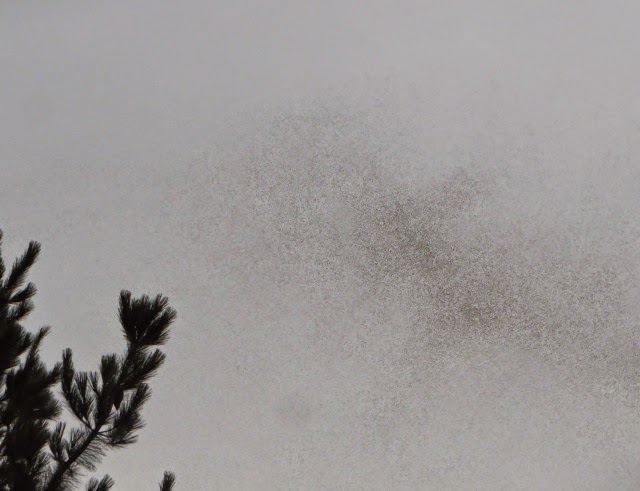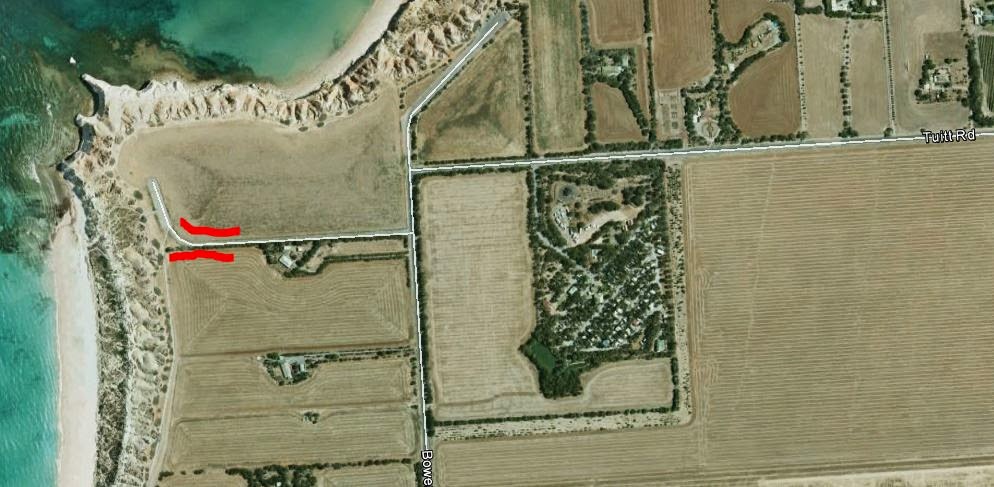Yacca, hard and otherwise
My friend Ian Fraser has posted about the genus Xanthorrhea and noted that in South Australia they are called yaccas. I commented that this caused me to recall orienteering through large patches of this stuff in South Australia. Unfortunately I don't have any images of such patches (it was in the 1970s - well before digital cameras, and I didn't carry a Kodak when doing cunning running). They are probably Xanthorrhoea semiplana described in a very interesting document as common in the Adelaide Hills.
I also referred in my comment to some plants of this genus (specifically Xanthorrhea australis) in the Australian National Botanic Gardens in Canberra, of which I do have an image.
The birds are Red Wattlebirds, a member of the honeyeaters although I am not sure if they are dining on the nectar or the insects attracted to that source of carbohydrate.
X. australis is found in localised patches in the Brindabella ranges behind Canberra. These images were taken on the track to Gibraltar Rocks.
These plants were not infested with birds, but I did catch a hoverfly incoming.
They are all very pretty, but my main purpose for this post was to think about the name of the plant. The formal name for the genus comes from two Greek words Xanthos (= yellow) and rheo (= I flow) referring to the resin which made the plants an important economic resource back in the day.
Getting back to the vernacular, "yacca" is my main business.
The document linked above includes the following "In South Australia it is commonly known as yacca or yakka, probably from a South Australian Aboriginal language (mostly likely Kaurna)." The meaning of the word in that language wasn't specified - I shall conclude this post by coming back to that point.
It is however almost a homophone of two other words. The first of these, given as an alternate spelling above) is almost always preceded by the word "hard" as in "hard yakka". The Australian National Dictionary Centre at ANU defines this as:
The Brisbane approach to the word has been taken on - quite reasonably IMHO - as the trading name of a line of workwear. I haven't used their kit myself but did enjoy their TV ads featuring a lot of grunting akin to imagery of a chain gang!
The other similar word to Yacca is Yucca. This is the English vernacular name (and indeed the formal genus name) for some plants in the Order Asparagales, family Asparagacea, native to the US and Mexico. In Australia they are either cultivated garden plants, or escapees as with this example at the Jerrabomberra Wetlands NR - from which I hope it has now been removed!
These were considered as part of the Lily family in the past but that was of course an offence to taxonomy and have now been put off with asparagus and many other things (at least until someone with a DNA sequencer is hard up for a publication). Interestingly Xanthorrhea is in the same Order but family Xanthorrhoeaceae.
It is well known that early European settlers of Australia adopted the names of European things that were visually similar (OK very approximately similar in some cases). The use of 'Robin' for a range of Australo-Papuan flycatchers, some of which have red breasts, is a great example. In this case we have two genera of plants with a broadly similar form, both of which poke up very impressive spikes of white flowers.
Now it appears that Linnaeus named Yucca in 1757 which well precedes the British settlement of South Australia in 1836. Given that none of my online sources indicate what 'yacca' meant in the indigenous language which may have been the origin of the name - and the link to that language always includes the word 'probably' - could it be that a Pom settler thought that Xanthorrhea sp looked rather like Yucca sp and the latter name was adopted by the indiginees from whom a slightly modified form of the word was acquired by the anthropologists? Just asking.
I also referred in my comment to some plants of this genus (specifically Xanthorrhea australis) in the Australian National Botanic Gardens in Canberra, of which I do have an image.
The birds are Red Wattlebirds, a member of the honeyeaters although I am not sure if they are dining on the nectar or the insects attracted to that source of carbohydrate.
X. australis is found in localised patches in the Brindabella ranges behind Canberra. These images were taken on the track to Gibraltar Rocks.
They are all very pretty, but my main purpose for this post was to think about the name of the plant. The formal name for the genus comes from two Greek words Xanthos (= yellow) and rheo (= I flow) referring to the resin which made the plants an important economic resource back in the day.
Getting back to the vernacular, "yacca" is my main business.
The document linked above includes the following "In South Australia it is commonly known as yacca or yakka, probably from a South Australian Aboriginal language (mostly likely Kaurna)." The meaning of the word in that language wasn't specified - I shall conclude this post by coming back to that point.
It is however almost a homophone of two other words. The first of these, given as an alternate spelling above) is almost always preceded by the word "hard" as in "hard yakka". The Australian National Dictionary Centre at ANU defines this as:
Work, strenuous labour. Also used as a verb meaning ‘to work’. The word is used especially in the phrase hard yakka. It comes from yaga meaning ‘work’ in the Yagara indigenous language of the Brisbane region. Yakka found its way into nineteenth-century Australian pidgin, and then passed into Australian English. First recorded 1847.As Brisbane is several thousand kilometres from the Adelaide Hills it seems unlikely that the two words are in any way related - although it certainly was hard yakka trying to run through the grass trees.
The Brisbane approach to the word has been taken on - quite reasonably IMHO - as the trading name of a line of workwear. I haven't used their kit myself but did enjoy their TV ads featuring a lot of grunting akin to imagery of a chain gang!
The other similar word to Yacca is Yucca. This is the English vernacular name (and indeed the formal genus name) for some plants in the Order Asparagales, family Asparagacea, native to the US and Mexico. In Australia they are either cultivated garden plants, or escapees as with this example at the Jerrabomberra Wetlands NR - from which I hope it has now been removed!
These were considered as part of the Lily family in the past but that was of course an offence to taxonomy and have now been put off with asparagus and many other things (at least until someone with a DNA sequencer is hard up for a publication). Interestingly Xanthorrhea is in the same Order but family Xanthorrhoeaceae.
It is well known that early European settlers of Australia adopted the names of European things that were visually similar (OK very approximately similar in some cases). The use of 'Robin' for a range of Australo-Papuan flycatchers, some of which have red breasts, is a great example. In this case we have two genera of plants with a broadly similar form, both of which poke up very impressive spikes of white flowers.
Now it appears that Linnaeus named Yucca in 1757 which well precedes the British settlement of South Australia in 1836. Given that none of my online sources indicate what 'yacca' meant in the indigenous language which may have been the origin of the name - and the link to that language always includes the word 'probably' - could it be that a Pom settler thought that Xanthorrhea sp looked rather like Yucca sp and the latter name was adopted by the indiginees from whom a slightly modified form of the word was acquired by the anthropologists? Just asking.








Comments
Martin